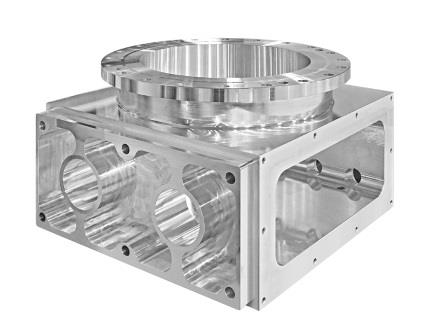POSTED ON 3/31/2022 – ![]() Mazak sat down with one of the major manufacturers in the semiconductor chip industry to discuss the ongoing chip shortage and the critical role that vacuum chamber machining plays in helping to meet surging demand. According to our industry insider, the huge demand for new vacuum processing chambers reflects the need to build new systems to produce chips as well as to replace worn out existing chambers.
Mazak sat down with one of the major manufacturers in the semiconductor chip industry to discuss the ongoing chip shortage and the critical role that vacuum chamber machining plays in helping to meet surging demand. According to our industry insider, the huge demand for new vacuum processing chambers reflects the need to build new systems to produce chips as well as to replace worn out existing chambers.
Out of the thousands of chambers produced each year, most are machined from billets of aluminum and/or steel, with a majority of the material machined away during the manufacturing process. Large chambers, for example, may start with 12,000 lbs of material and end up weighing only 1,000 lbs or less. To do that, suppliers must remove massive amounts of material quickly and cost-effectively, hold extremely tight tolerances and maintain competitiveness. Today’s vacuum chamber suppliers combine several of the latest advanced manufacturing technologies, including horizontal machining centers, full five-axis machines and those with friction stir welding (FSW) capability. Such machines often feature large tool storage units and are incorporated into palletized automation systems.
“From a machining perspective, all the necessary components to produce chips are getting bigger,” said our inside source, “but it’s a bit ironic that while the chambers and other components and wafer sizes are larger, the chips continue to shrink in size.” The once-typical 127 mm wafer is now 330.2 mm and trending toward 450 mm. Larger wafers allow manufacturers to apply more dye so they can produce more chips out of one wafer.
Bigger vacuum chambers translate into longer machining times, and depending on chamber complexity, those times can run into the hundreds of hours. This is why many companies that supply chambers opt for horizontal machining centers, such as Mazak’s HCN 6800 or HCN 8800, outfitted with substantial tool storage capacity, up to as many as 300 tools. And for continuous production, these manufacturers incorporate multiple machines into automated palletized systems such as Mazak’s PALLETECH.

